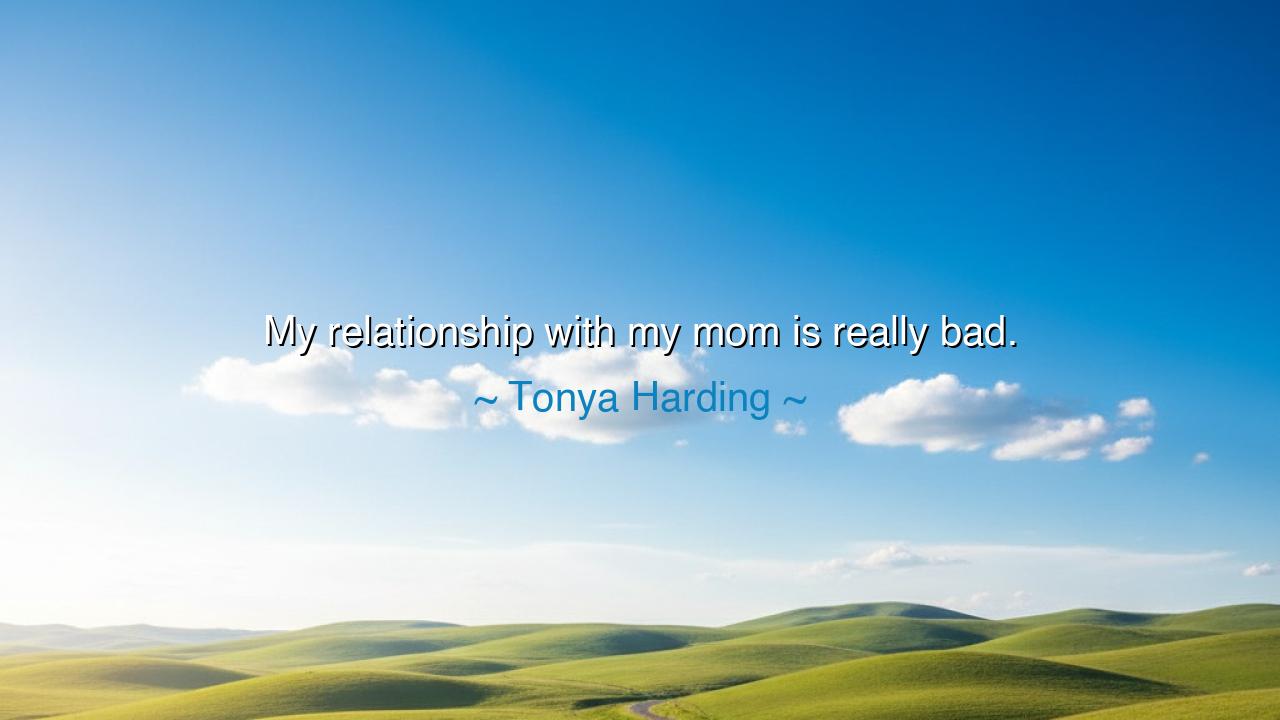
My relationship with my mom is really bad.






When Tonya Harding said, “My relationship with my mom is really bad,” her words carried not just the pain of one daughter, but the echo of many souls torn between love and survival. The bond between mother and child is meant to be sacred — the first mirror through which we see the world. When that mirror is cracked, the reflection of the self becomes uncertain. Harding’s confession is raw and human; it unveils a truth the ancients knew well — that even the holiest relationships can be marked by struggle, and that from conflict can arise a deeper form of self-understanding.
In the old myths, we find many such rifts between parent and child. Think of Medea and her sons, or Oedipus and Jocasta — relationships steeped in destiny, pain, and misunderstanding. The ancients did not hide from such truths; they believed that the bond between parent and child could hold both divine love and mortal anguish. Harding’s words reveal that same tension. Her mother’s love may have been fierce, perhaps even cruel, born of the harshness of the world they inhabited. In such homes, affection can turn into pressure, and protection into control. The heart of the child, yearning for warmth, meets the hand of a parent hardened by survival — and the result is a storm that scars both.
To speak such words aloud — “my relationship with my mom is really bad” — is an act of both sorrow and courage. It is to name the wound that others hide. Harding’s life, shaped by struggle, ambition, and controversy, mirrors a larger tragedy: how the pursuit of greatness can be warped when love itself becomes conditional. Her skating was her freedom, her way of earning approval in a world where tenderness was scarce. But when love must be earned, the child grows strong in skill yet fragile in spirit. The heart learns to fight, but forgets how to rest.
Consider the life of Emperor Marcus Aurelius, the philosopher-king. He lost his father at a young age and was raised by stern guardians. Though he became one of history’s wisest rulers, his writings in Meditations reveal a constant yearning for gentleness and inner peace. “Be like the rock against which the waves break,” he wrote, perhaps to remind himself that even when love fails us, we can still find virtue within. Harding’s truth echoes this lesson — that brokenness can give birth to resilience, if the heart refuses to harden in return.
The ancient sages would say that pain in the family is the fire through which the soul is forged. To be hurt by one’s parent is to be tested in the deepest way, for it challenges our capacity to forgive, to grow, to create something different from what we were given. Harding’s story reminds us that even those who fall, even those who are cast out by the world’s judgment, carry within them the power to transmute pain into strength. Her confession is not only about suffering — it is a doorway to healing, should one choose to walk through.
The lesson is this: we are not doomed to repeat the wounds we inherit. Each generation has the sacred duty to break the chains of cruelty, misunderstanding, or silence that bound the ones before. If your relationship with your parent is broken, let it not be the end of love, but the beginning of understanding. Seek compassion — not always for them, but for yourself. For only when we forgive the past, even if from afar, can we step into the light of peace.
And so, to future generations, remember this: the pain between parent and child is among the oldest of human sorrows, but it need not define you. You are more than your suffering. From the ashes of a “bad relationship” can rise the wisdom to love differently — to give what was withheld, to soften where the world was cruel. Harding’s words, stripped of bitterness, become a quiet prayer: that someday, we learn to love without fear, and to raise our children not from our wounds, but from our healing.






AAdministratorAdministrator
Welcome, honored guests. Please leave a comment, we will respond soon